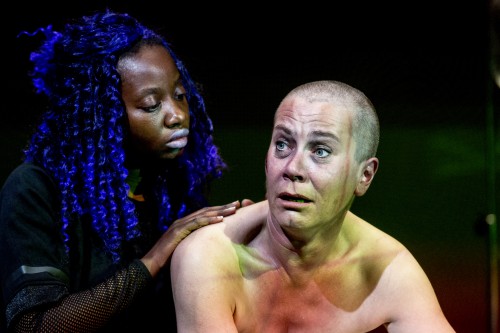Playhouse, August 30
If you’re desperate to hold any Shakespeare up to a dreamlike distorting mirror, Titus Andronicus is the one. It’s already a carnival of grotesques; of blood, murder and mutilation on a heroic scale. Thirteen die during the show and another is condemned, and director Adena Jacobs (for Bell Shakespeare) rounds that up one by killing off Aaron and Tamora’s illicit baby – just for good measure.
Some might ask why anyone would bother staging Titus, itself a bastard child of the Shakespeare canon, variously considered a send-up of Marlovian revenge tragedy or the Bard’s first baby steps towards Hamlet. The latter it assuredly is not, but nor was it necessarily an elaborate satire. Revenge tragedies, as big then as identity politics can be now, were penned for the same audience that was entertained by traitors being hanged, drawn and quartered (wouldn’t the Department of Home Affairs love to bring that back!), or bears being baited by dogs. Now if you’ve just seen a beheading that didn’t go too smoothly, stage violence could seem a bit tame, unless spiced up with tongues cut out and cannibalism.
 “Rome is but a wilderness of tigers,” cries Titus, although this wilderness is not so much the precursor to Gloucester’s eyes in Lear or to the curtain coming down on Polonius’s volubility in Hamlet, as it is to the Black Knight in Monty Python and the Holy Grail or to Game of Thrones. Titus genuinely foreshadows the latter in terms of cruelty, vengeance and gallons of gore, and even more in its reckless annihilation of key characters. In fact Game of Thrones does that better, because it kills off people about whom we care, whereas in Titus we barely give a toss about a soul.
“Rome is but a wilderness of tigers,” cries Titus, although this wilderness is not so much the precursor to Gloucester’s eyes in Lear or to the curtain coming down on Polonius’s volubility in Hamlet, as it is to the Black Knight in Monty Python and the Holy Grail or to Game of Thrones. Titus genuinely foreshadows the latter in terms of cruelty, vengeance and gallons of gore, and even more in its reckless annihilation of key characters. In fact Game of Thrones does that better, because it kills off people about whom we care, whereas in Titus we barely give a toss about a soul.
Andronicus is too much of a monster to milk our sympathy, even when played (as a man) by the sensational Jane Montgomery Griffiths, whose voice and feel for words royally flatter what is mostly rather unremarkable verse. At the outset he laments losing 21 of his 25 sons (no wonder Mrs Andronicus has fled to meet her maker) in war, promptly kills another who gainsays him, and in the finale slaughters his daughter Lavinia just to end his own sorrow.

Lavinia (Jayna Patel) is the one to whom we might have opened our hearts, had not Jacobs’ 110-minute version of the script largely eliminated her. The director has also pruned Tamora’s role to a bewildering degree, wasting Melita Jurisic’s splendid performance. Josh Price wrestles with the tiresome Marcus, Titus’s brother, but fails to move a molecule of pity in us when he happens upon Lavinia after her rape and mutilation.
Despite being the author of much of the play’s mayhem, Aaron might have held some appeal (in the grand tradition of likable villains), because he alone has a sense of humour (beyond Titus’s Pythonesque quips). Alas, Tariro Mavondo reduces the verse’s winking malevolence to the flatness of a school speech.
Amid these defects some of Jacobs’ ideas are jaw-droppingly wondrous, aided by striking visual and aural design elements, such as the use of masks, puppetry, singing and makeup that gives some characters a decaying, statue-like appearance. Ultimately, however, the director’s distorting mirror reflects a kaleidoscope of disparate visions that never coalesce into a cohesive whole. At least she entrusted much of the violence to our already over-heated imaginations, but not so the gratuitous scatological elements. One has no sense of her having answered the play’s fundamental question: why bother?
Until September 27.